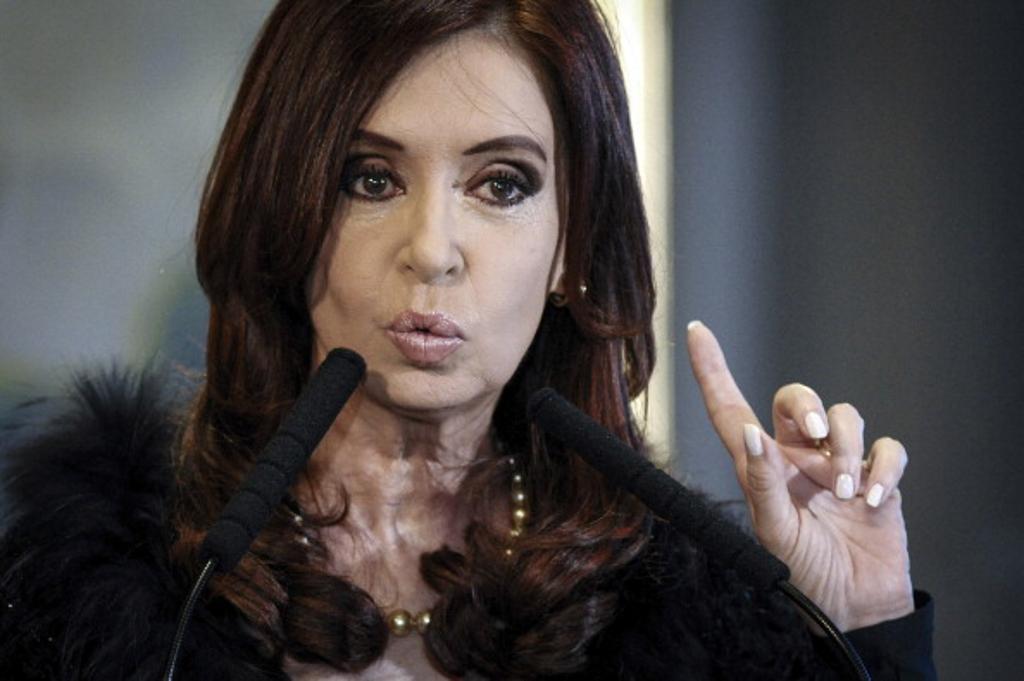Argentina’s economy is in crisis. So it focuses on the Falklands, of course.
President of Argentina Cristina Fernandez de Kirchner speaks in late August to announce the creation of a development center for the national audiovisual industry.
WASHINGTON — Argentines have given so much to the world, yet have so little to show for it.
The second largest country in Latin America has given birth to music (tango), soccer stars (Maradona and Messi) and popular icons (Eva Peron) that have mesmerized the world for decades. Its people are known to be exciting, passionate and predisposed to living in the moment; qualities that endear them to the millions of tourists that grace its shores each year.
Yet despite their penchant for greatness, the Argentine people habitually elect leaders that are not worthy of leadership.
Cristina Fernandez de Kirchner is only the latest manifestation of this trend, but even by Argentina’s standards she has raised the bar for poor governance.
Argentina’s economy stands on the brink of collapse after years of mismanagement, with long-term government bond yields of 10.5 percent exceeding even those of governments in crisis such as Greece.
Such a situation is not atypical in the country’s history. Argentina has defaulted on or restructured its debt on no less than six occasions, leading Giselle Datz to brand the country as a “serial defaulter.”
Clearly for the Argentine government, debt bestows an expectation, rather than an obligation, for repayment.
Having relied on Venezuelan President Hugo Chavez as a lender of last resort through much of her presidency, President Kirchner appears to have used up the last of her lines of credit.
Earlier this year, the US Supreme Court ordered the repayment of as much as $15 billion to cover past defaulted debt and penalties. The IMF — tired of Argentina’s poor, if not fraudulent, bookkeeping — has given it until the end of 2013 to bring its statistics up to standard, or risk reprisal. With inflation at 26 percent, this could be the final nail in the peso’s coffin.
Yet as with past crises, it’s the Argentine middle class that is bearing the brunt of it. Runaway inflation is causing wages to rapidly decline in real terms, while erasing any household savings that have been made in the eight years since the last crisis.
Little wonder Argentines are predisposed to live in the moment.
So as its currency defaults, police forces go on strike and looting across the country turns deadly, what can we expect from Argentina’s president?
Most likely a continued focus on the Falkland Islands (known locally as Las Malvinas).
Perhaps the defining legacy of Fernandez de Kirchner’s presidency has been her dogmatic pursuit of “justice” for the Falklands, a collection of islands with a population of 2,932 people — over 99 percent of whom voted to remain a British protectorate earlier this year.
Blaming external factors for internal problems is hardly unique to Argentina. It is a deception as old as time, utilized by leaders in countries as diverse as Venezuela, Syria and Uzbekistan. In each case, however, a failure to address the underlying issue begets a failure to solve it.
Regardless of the validity of Argentina’s claim to the Falklands, the country has far greater concerns to tend to, and it’s incumbent upon its leaders to address them.
If they choose to work with the IMF, a thawing of relations and a restructuring of its debt is still eminently possible. Moreover, if President Kirchner shows a willingness to uphold the rule of law with regards to foreign investors, Argentina will likely see other multinational corporations follow Chevron’s example in investing heavily in the country, delivering a much-needed boost to the economy.
For their part, the Argentine people must demand these actions of their leaders, something they are beginning to do through strikes and protests.
They would be better served, however, to address their concerns at the ballot box.
President Kirchner’s Front for Victory party suffered heavy defeats in the recent midterm elections, but voters will have to wait until 2015 to elect her successor. If they are wise enough to elect a leader that shuns short-term promises in favor of long-term stability, they will surely be rewarded.
Living in the moment has become a costly endeavor.
Alexander Botting works for the Washington firm of Fabrini and Company, which provides political and business consultation to Clients from Latin America, Europe, Eurasia and Central America. The firm does not do business in Argentina.
Every day, reporters and producers at The World are hard at work bringing you human-centered news from across the globe. But we can’t do it without you. We need your support to ensure we can continue this work for another year.
Make a gift today, and you’ll help us unlock a matching gift of $67,000!
